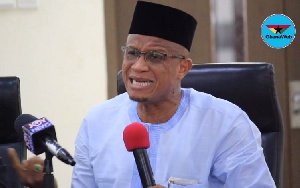Dr Mustapha Abdul-Hamid, the Information Minister, has urged Governments inhibiting press freedom to open up for the common good of society.
He entreated the media to make gains of that freedom by not sacrificing the integrity and the future of the society on the altar of the quest to break news.
He gave the assurance that government would further deepen the country’s democratic governance and empower the citizens to exercise their rights by passing the Right to Information Bill into law.
Dr Abdul-Hamid made the remarks at the opening ceremony of the 25th Edition of the 2018 World Press Freedom Day, in Accra on Wednesday.
He urged media owners to invest in specialisation so that they could accurately inform the public considering the enormous power of the media to shape societal values, adding that it behoved on various stakeholders to assist the media to perform their duties responsibly.
“Keeping Power in Check: Media, Justice and the Rule of Law” was the theme for the event, being hosted by the Government of Ghana and the United Nations, Educational, Scientific and Cultural Organisation (UNESCO).
The event brought together about 7,000 journalists, media practitioners and academics across the world to mark the Day.
The day is commemorated on May 3, every year globally, which seeks to raise awareness on the need for press freedom and remind governments worldwide on their responsibility to respect the freedom of expression as enshrined in Article 19 of the 1948 Universal Declaration of Human Rights.
The World Press Freedom Index ranked Ghana 23rd in the world and first on the Africa continent.
The participants observed a minute silence for many journalists who had lost their lives in line of duty and those who had suffered various brutalities in performing their constitutional duties.
The Information Minister said the country had enjoyed 25 years of uninterrupted democratic rule during which there had been constitutional provisions for the right of free expression and the freedom of the media that had contributed immensely towards shaping policies and governance process.
He noted that the framers of the country’s constitutions saw that for any democratic society to grow, it was imperative to give the people space to express their thoughts and the right to access the media without licensing.
Those rights, he said, had enabled the citizenry to participate in the governance process and provided feedback on government’s policies and programmes, as well as helping to shape policies of government for the betterment of the society.
Additionally, it had offered platform for the civil society organisations to freely interrogate government policies and offered the necessary critiques to complement government’s efforts, while the opposition political parties had raised discerning views and alternative policies for consideration by the citizenry.
Dr Abdul-Hamid called on the leaders of other jurisdictions where press freedom and expression had not been fully embraced to open up their societies so that the people would freely engage in vigorous exchange of ideas to accelerate national development.
The Minister made reference to the emerging challenges facing the media as a result of the new media technology, which posed risk to the media freedom, mentioning the deliberate misinformation campaign by some elements in the democratic state and inadvertent misinformation by some media practitioners in their desire to be the first to break the news.
While some political actors in their quest to win the public relation battles used the many media outlets to publish misleading information and fabrications to achieve their political ambition.
The Information Minister noted that those manoeuvring served as a major threat to the sanctity of the media freedom and undermined professional media practice and, thus, urged the media fraternity to boldly confront it and nib it in the bud.
Mr Getachew Engida, the Deputy Director General of UNESCO, on his part, commended the successive governments for entrenching press freedom in the country and dedicated to economic freedom of the citizenry.
He said UNESCO over the years had been partnering the government of Ghana to implement various programmes to better the lots of the people.
Mr Engida used the occasion to express his condolences to the families of 25 journalists who had lost their lives in the beginning of this year, and 11 journalists killed in Afghanistan in the line of duty.
He said the World Press Freedom Day would provide the opportunity for fruitful exchange of ideas by key stakeholders to enhance the freedom of the media landscape and ensure peaceful environment for media practice.
General News of Wednesday, 2 May 2018
Source: ghananewsagency.org













